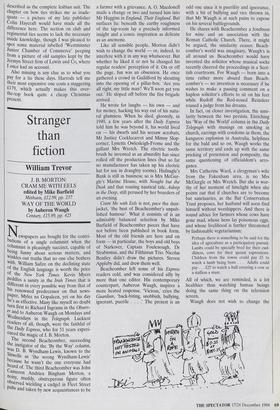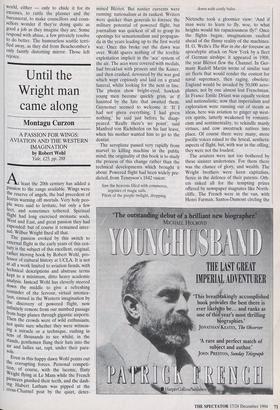Stranger than fiction
William Trevor
Newspapers are bought for the contri- butions of a single columnist when the columnist is pleasingly succinct, capable of being funny about serious matters, and Winkles out truths that no one else bothers with. William Safire on the declining state of the English language is worth the price of the New York Times. Kevin Myers Peddles a sanity in the Irish Times that is different in every possible way from that of his renowned predecessor on that news- P, oper, Myles na Gopaleen, yet on his day he's as effective. Many like myself no doubt turn first to Richard Ingrams in the Observ- er and to Auberon Waugh on Mondays and Wednesdays in the Telegraph. Luckiest readers of all, though, were the faithful of the Daily Express, who for 51 years experi- enced the magic of J. B. Morton. The second Beachcomber, succeeding the instigator of the 'By the Way' column, Was D. Di ”. Wyndham-Lewis, known to the Sltwells as 'the wrong Wyndham-Lewis' because he wasn't the one everyone had heard of. The third Beachcomber was John Cameron Andrieu Bingham Morton, a n°18Y, muddy, obstreperous figure often observed wielding a cudgel in Fleet Street pubs and taken by new acquaintances to be a farmer with a grievance. A. G. Macdonell made a change or two and turned him into Mr Huggins in England, Their England. But surfaces lie: beneath the earthy roughness of the tap-room lay a precisely informed insight and a comic inspiration as delicate as an anemone.
Like all sensible people, Morton didn't wish to change the world — or, indeed, to interfere with it in any way whatsoever. But whether he liked it or not he changed his regular readers' perception of it. On or off the page, fun was an obsession. He once gathered a crowd in Guildford by shouting into the opening of a pillar-box: 'Are you all right, my little man? We'll soon get you out.' He sloped off before the fire brigade arrived.
He wrote for laughs — his own — and for money, hacking his way out of his natu- ral glumness. When he died, gloomily, in 1949, a few years after the Daily Express told him he was beyond it, his world lived on — his dwarfs and his seesaw acrobats, Mr Justice Cocklecarrot and Mimsy Slop- corner, Lynette Owlesleigh-Frome and the gallant Mrs Wretch. The electric tooth- brush he invented as an absurdity has since rolled off the production lines (but so far no manufacturer has taken up his electric hat for use in draughty rooms). Hufnagle's Bank is still in business; so is Mrs McGur- gle's Marine House, with Nought but the Dusk and that rousing nautical tale, Asleep in the Deep, still perused by her boarders of an evening.
Cram Me with Eels is not, pace the dust- jacket, 'the best of Beachcomber's unpub- lished humour'. What it consists of is an admirably balanced selection by Mike Barfield of Beachcomber pieces that have not before been published in book form. Most of the old friends are here and on form — in particular, the boys and old boys of Narkover, Captain Foulenough, Dr Strabismus, and the Filthistan Trio. Nicolas Bentley didn't draw the pictures. Steven Appleby did, and drew them well.
Beachcomber left some of his Express readers cold, and was considered silly by more than one editor. His contemporary counterpart, Auberon Waugh, inspires a more heated response. 'Vicious,' cries the Guardian, tack-biting, snobbish, bullying, ignorant, puerile . . . .' The protest is an odd one since it is puerility and ignorance, with a bit of bullying and vice thrown in, that Mr Waugh is at such pains to expose on his several battlegrounds.
He shares with Beachcomber a fondness for wine and an association with the Roman Catholic Church. There, it might be argued, the similarity ceases: Beach- comber's world was imaginary, Waugh's is all around us. Beachcomber would have invented the solicitor whose musical socks recently cheered the proceedings in a Scot- tish courtroom. For Waugh — born into a time rather more absurd than Beach- comber's — no invention is necessary if he wishes to make a passing comment on a hapless solicitor's efforts to sit on his feet while Rudolf the Red-nosed Reindeer roused a judge from his dreams.
In fact, on closer investigation, the simi- larity between the two persists. Enriching his Way of the World' column in the Daily Telegraph with musings on smoking in church, earrings with condoms in them, the kangaroo explosion in Australia, helplines for the bald and so on, Waugh works the same territory and ends up with the same pricking of pretension and pomposity, the same questioning of officialdom's arro- gance.
Mrs Catherine Ward, a clergyman's wife from the Fakenham area, is no Mrs McGurgle or Mrs Wretch. But she is wor- thy of her moment of limelight when she points out that if churches are to become bat sanctuaries, as the Bat Conservation Trust proposes, her husband will soon find himself without worshippers. And there is sound advice for farmers whose cows have gone mad, whose hens lay poisonous eggs, and whose livelihood is further threatened by fashionable vegetarianism:
Perhaps there is something to be said for the idea of agriculture as a participatory pursuit. Lambs could be specially bred for their cud- dliness, cows for their quaint expressions. Children from the towns could pay £5 to watch a lamb being born . . . Adults could pay ... £25 to watch a bull covering a cow or a stallion a mare.
All of which, we are reminded, is a lot healthier than watching human beings doing the same thing on the television screen.
Waugh does not wish to change the
world, either — only to chide it for its excesses, to rattle the planner and the bureaucrat, to make councillors and coun- sellors wonder if they're doing quite as good a job as they imagine they are. Some respond with abuse, a few privately resolve to do better. The humourless scuttle terri- fied away, as they did from Beachcomber's only faintly distorting mirror. Those left rejoice.











































































































 Previous page
Previous page